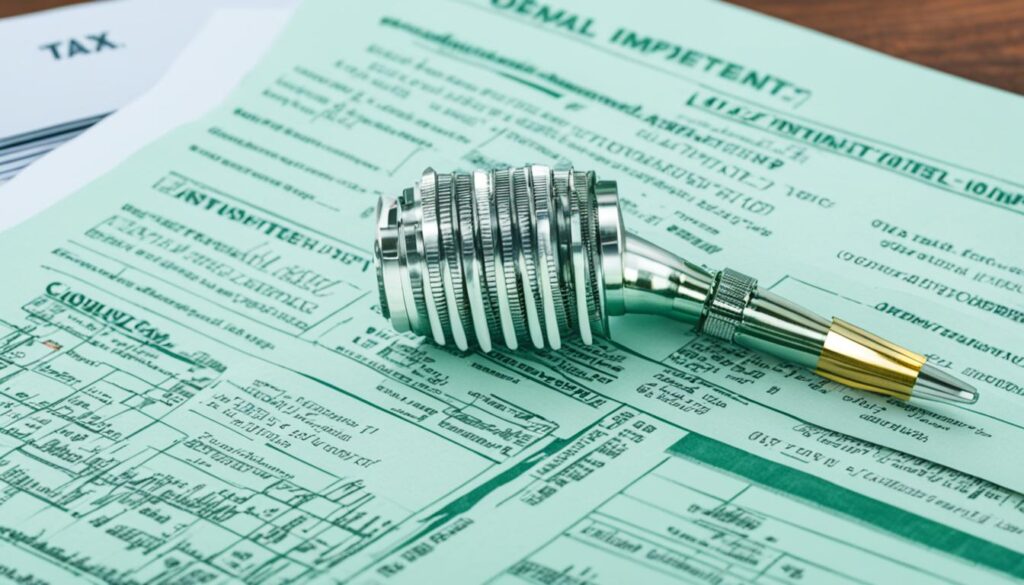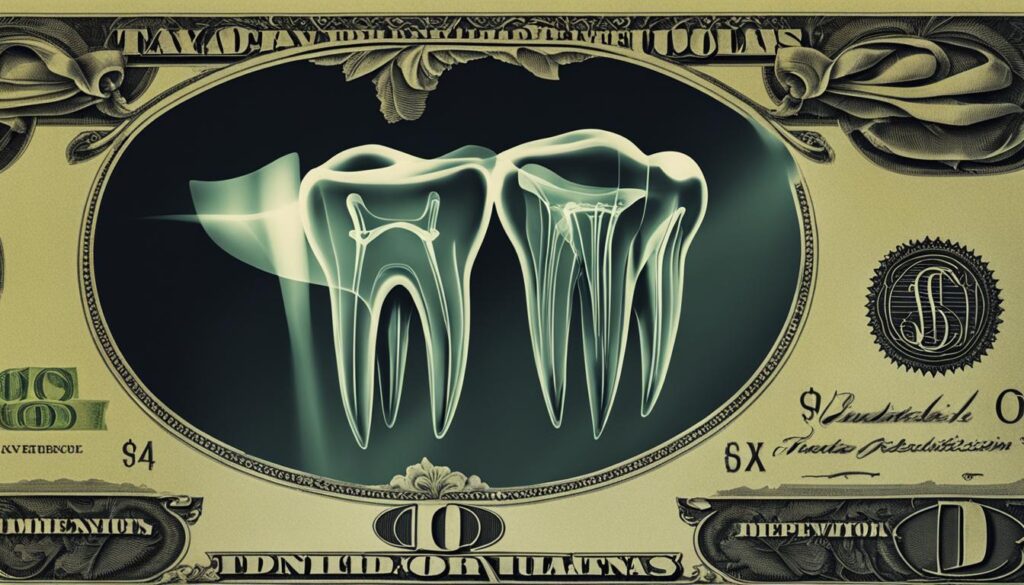When it comes to dental implants, there’s no denying their benefits. They can enhance your smile, improve chewing capabilities, and boost your confidence. But did you know that dental implants might also offer a surprising financial advantage? Are implants tax deductible? It’s a question that many people are curious about, and the answer might surprise you.
According to IRS Topic 502: Medical and Dental Expenses, dental implants can be considered a deductible expense. However, there are specific rules and limitations set by the IRS. To make sure you’re aware of all the details, continue reading to find out how you can potentially save money on your dental implant expenses.
Key Takeaways:
- Dental implants may be eligible for tax deductions under certain circumstances.
- You must itemize your expenses and the amount that exceeds 7.5% of your gross income can be deducted.
- Expenses covered by insurance cannot be included in the deduction calculation.
- To maximize your deductions, keep track of all your medical and dental expenses, including consultations and follow-up visits.
- Consider opening a Health Savings Account (HSA) to further reduce your tax liability.
How to Maximize Dental Implant Tax Deductions
To maximize your dental implant tax deductions, it’s essential to keep track of all your medical and dental expenses. This includes not only the cost of the dental implants themselves but also any related costs such as consultations, diagnostic tests, and follow-up visits. It’s recommended to keep detailed records, including receipts and invoices, to support your deductions. Additionally, considering opening a Health Savings Account (HSA) can provide additional tax benefits. An HSA allows you to deduct pre-tax money specifically for medical and dental expenses, potentially reducing your overall tax liability.
Dental Implant Tax Deduction Checklist
When preparing for tax season, follow this checklist to ensure you maximize your dental implant tax deductions:
- Keep track of all your dental expenses, including the cost of dental implant surgery, consultations, diagnostic tests, and follow-up visits.
- Organize your receipts and invoices by category to make it easier to calculate your deductions accurately.
- Determine if you meet the IRS requirements for itemizing deductions. If you do, you can claim your dental implant expenses as part of your medical and dental expenses.
- If you are eligible, consider opening a Health Savings Account (HSA) to set aside pre-tax funds specifically for medical and dental expenses.
- Consult with a tax professional to ensure you are aware of the latest IRS rules and regulations regarding dental implant deductions.
By following these steps, you can maximize your dental implant tax deductions and potentially reduce your overall tax burden.
The Benefits of Health Savings Accounts (HSAs)
Health Savings Accounts (HSAs) offer several advantages when it comes to dental implant expenses. Not only can you deduct pre-tax money specifically for medical and dental costs, but you can also enjoy the following benefits:
- Tax Savings: Contributions to your HSA are tax-deductible, reducing your overall taxable income.
- Flexibility: You can use the funds in your HSA to pay for various medical and dental expenses, including dental implant surgeries and related costs.
- Interest Growth: Any funds left in your HSA earn interest and can be rolled over from year to year, allowing you to build a tax-free savings account for future medical and dental needs.
Consult with your employer or human resources department to discuss HSA options and take advantage of the benefits they offer.
Consult with a tax professional to ensure you are taking full advantage of the available tax benefits and to navigate the complexities of dental implant tax deductions.
Important Considerations for Dental Implant Tax Deductions

When it comes to claiming dental implant tax deductions, navigating the IRS rules and regulations is essential. With tax laws subject to change each year, staying informed about the latest regulations is crucial for maximizing your tax savings. To ensure you’re making the most of dental implant tax deductions, consider consulting with a tax professional who can guide you through the complexities of the process.
Remember, to claim deductions, you must itemize your expenses, and the total amount must exceed 7.5% of your gross income. This means that if your gross income is $50,000, the first $3,750 of dental implant expenses cannot be claimed. Deductions can only be applied to the amount that exceeds this threshold.
A tax professional can help you identify all eligible expenses and ensure that you are complying with IRS rules. They can provide personalized advice based on your unique financial situation and help you optimize your dental implant tax savings.
Staying up to date with the latest IRS guidelines is crucial for avoiding any unnecessary penalties or audits. With the help of a tax professional, you can confidently navigate the ever-changing landscape of dental implant tax deductions and reduce your tax liability effectively.
Remember, making the most of dental implant tax deductions requires careful planning, documentation, and compliance with IRS regulations. By working with a knowledgeable tax professional and staying informed about tax law changes, you can maximize your dental implant tax savings and enjoy the financial benefits.
The Benefits of Health Savings Accounts (HSAs)
When it comes to dental implant expenses, Health Savings Accounts (HSAs) offer a smart financial solution. With an HSA, you have the opportunity to contribute pre-tax money specifically for medical and dental costs. This means that you can set aside funds to cover various expenses associated with dental implants, including consultations, surgeries, and follow-up care.
By utilizing an HSA, you not only lower your taxable income but also potentially save money on dental procedures. This can significantly reduce the financial burden of dental implant expenses, making them more affordable and accessible.
If you haven’t opened an HSA yet, now is the perfect time to inquire with your employer or human resources department about setting one up. By having an HSA in place, you can take advantage of the tax benefits it provides and confidently pursue the dental implant procedure you need.
| HSA Benefits | Traditional Health Insurance |
|---|---|
| Lower taxable income | Not applicable |
| Potential tax savings | Not applicable |
| Flexibility to use funds for dental implants | Restricted coverage |
| Control over healthcare expenses | Dependent on insurance coverage |
| No deadline for using funds | Yearly insurance renewal |
Unlocking Financial Freedom with HSAs
With an HSA, you gain the freedom to allocate funds directly towards essential dental procedures like dental implants. Unlike traditional health insurance plans, HSAs offer more control, flexibility, and potential tax savings. You’ll have peace of mind knowing that you can take care of your oral health needs without breaking the bank.
Don’t miss out on the advantages provided by a Health Savings Account. Consult with your employer or human resources department today to explore the benefits of HSA dental implants and how they can assist your financial journey towards a healthier smile.
Stay Informed About Tax Law Changes

When it comes to dental implant tax deductions, staying updated on tax law changes is crucial. The IRS periodically revises its guidelines for medical and dental expenses, including deductions for dental implants. By keeping yourself informed about any changes or revisions, you can ensure that you are maximizing your tax savings and making the most of your dental implant expenses. Stay proactive and be aware of any adjustments to tax laws that may affect your eligibility for deductions.
Consult with a Tax Professional
If you want to navigate the complexities of dental implant tax deductions seamlessly, it’s highly advisable to consult with a tax professional. A qualified tax professional can provide personalized advice tailored to your individual financial situation. They can guide you through the IRS rules and regulations concerning dental implant deductions, help you properly document your expenses, and ensure that you are taking full advantage of the available tax benefits. Don’t hesitate to seek professional assistance to make the most of your dental implant tax deductions.
Regularly Check for Updates
Regularly checking for updates on tax laws is a wise move. By staying in the loop, you can stay ahead of any revisions or changes that may affect your dental implant tax deductions. The IRS announces important updates and changes on its official website, so make it a habit to visit the site and keep yourself informed. Consider subscribing to IRS newsletters or following official IRS social media accounts to receive timely updates on tax law changes that may impact your deductible dental implant expenses.
Remember, the tax landscape can change over time, and it’s essential to stay informed to ensure you are maximizing your deductions and meeting all requirements. Consulting with a tax professional is always a smart idea, as they can keep you updated on any pertinent changes and help optimize your dental implant tax deductions.
Consult with a Tax Professional

When it comes to navigating the intricacies of dental implant tax deductions, it’s highly recommended to consult with a tax professional. A qualified tax professional can provide personalized advice based on your specific financial situation and help you understand the IRS rules and regulations regarding dental implant deductions. They can assist you in properly documenting and claiming your dental implant expenses and ensure that you are maximizing your tax savings while staying in compliance with the law.
Here are some reasons why consulting with a tax professional is beneficial:
- Expert Guidance: Tax professionals have in-depth knowledge of the IRS rules on dental implant deductions. They can guide you through the process and answer any questions you may have, ensuring that you are well-informed and making the right financial decisions.
- Maximize Savings: A tax professional can help you identify all eligible expenses related to your dental implants, including both the direct costs and any associated expenses. They can ensure that you are taking advantage of all available deductions to lower your tax liability and maximize your savings.
- Documentation Assistance: Proper documentation is crucial when claiming dental implant tax deductions. A tax professional can help you organize and maintain the necessary documentation, ensuring that you have the necessary paperwork and receipts to support your deductions.
- Stay Updated: Tax laws and regulations may change over time. By consulting with a tax professional, you can stay updated on any changes that may affect your dental implant tax deductions. They can provide you with the latest information and help you adapt your tax strategy accordingly.
In summary, consulting with a tax professional can provide valuable guidance and assistance when it comes to maximizing your dental implant tax deductions. They can help you understand the IRS rules, ensure proper documentation, and stay updated on any changes in tax law. By working with a tax professional, you can navigate the complexities of dental implant deductions with confidence and make the most of your tax savings.
Final Thoughts on Dental Implant Tax Deductions
So, you’re considering dental implants and wondering about the tax benefits. Well, the good news is that dental implant tax deductions can provide some much-needed financial relief. By understanding and adhering to the IRS rules and regulations, you have the opportunity to lower your taxable income and save money on your dental implant expenses.
To make the most of dental implant tax deductions, it’s essential to keep detailed records of all your medical and dental expenses. This includes not just the cost of the dental implants themselves but also related expenses like consultations, diagnostic tests, and follow-up visits. By documenting everything and maintaining a thorough record, you’ll be well-prepared to claim the deductions you’re entitled to.
Another way to maximize your savings is by considering a Health Savings Account (HSA). By contributing pre-tax money to an HSA, you can allocate funds specifically for medical and dental costs, including dental implants. This not only lowers your taxable income but also offers additional tax benefits.
Finally, staying informed about any changes in tax laws is crucial. The IRS may revise its guidelines for medical and dental expenses, including dental implant deductions. So, it’s essential to stay proactive and keep yourself apprised of any updates. Consulting with a tax professional is always a smart move to ensure you’re fully leveraging the available tax benefits and effectively navigating the complexities of dental implant tax deductions. So, grab a cup of coffee, gather your documents, and get ready to save!








